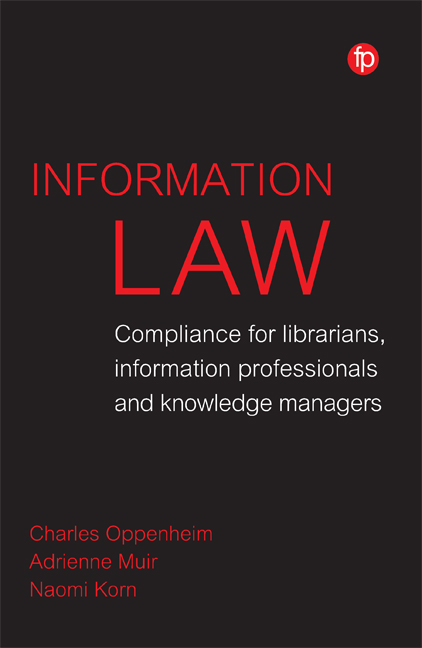Book contents
- Frontamtter
- Contents
- List of Acronyms
- List of Figures and Tables
- List of Case Studies
- Introduction
- 1 Copyright and Related Rights
- 2 Data Protection
- 3 Freedom of Information
- 4 Governance, Audits and Risk Assessment
- 5 Policies
- 6 Procedures: Copyright and Related Rights
- 7 Procedures: Using and Negotiating Licences for Access to Information Resources
- 8 Procedures: Data Protection and Freedom of Information
- 9 Tools and Templates
- 10 Awareness and Engagement
- 11 Some Speculations About the Future
- Appendix 1 Carrying out an Information Asset Audit
- Appendix 2 Sample IP Policy
- Appendix 3 Sample Data Protection Policy
- Appendix 4 Possible Contractual Terms for Online Access to Database Service
- Appendix 5 Data Protection Privacy Notice Template
- Bibliography
- Index
Introduction
Published online by Cambridge University Press: 29 July 2020
- Frontamtter
- Contents
- List of Acronyms
- List of Figures and Tables
- List of Case Studies
- Introduction
- 1 Copyright and Related Rights
- 2 Data Protection
- 3 Freedom of Information
- 4 Governance, Audits and Risk Assessment
- 5 Policies
- 6 Procedures: Copyright and Related Rights
- 7 Procedures: Using and Negotiating Licences for Access to Information Resources
- 8 Procedures: Data Protection and Freedom of Information
- 9 Tools and Templates
- 10 Awareness and Engagement
- 11 Some Speculations About the Future
- Appendix 1 Carrying out an Information Asset Audit
- Appendix 2 Sample IP Policy
- Appendix 3 Sample Data Protection Policy
- Appendix 4 Possible Contractual Terms for Online Access to Database Service
- Appendix 5 Data Protection Privacy Notice Template
- Bibliography
- Index
Summary
This book provides an overview of important information law issues for library, information and knowledge (hereinafter LIK) workers. Focusing specifically on copyright and other intellectual property rights (IPR), freedom of information (FoI), and data protection, the book is based upon UK law as of November 2019. The relevant laws in other countries sometimes differ a bit from UK law, sometimes a lot, and this fact should be borne in mind by readers. LIK workers need to know about these areas of law, both because their organisations must comply with the law and because this knowledge provides them with tools when responding to user enquiries. For example, knowledge of what can be obtained by use of freedom of information legislation can be extremely helpful to users. Thus LIK workers, often at the front line of managing and monitoring their organisation's legal compliance, have roles and responsibilities in both complying with the law and taking advantage of its provisions from time to time.
On a broader level, information law issues dovetail together, creating a sophisticated, complex and delicate balance between facilitating open and free access to information – thus supporting open and accountable government, democratic freedom and an uncensored press – sim ul taneously with the necessity for control and privacy. This balance is not always successfully achieved, which can result in tension and sometimes legal cases and court judgments. Information law tries to achieve this balance by creating clarity about what is definitely legal or illegal, whilst providing exemptions and exceptions and room for interpretation, risk management and the user's own ‘gut feeling’ by the frequent use of terms such as ‘reasonable’, ‘fair’ and ‘justifiable’. LIK workers are operating in a constantly changing digital space in which everyone is often simul taneously a content creator, publisher and user. This makes the interpretation and application of laws that are steeped in hundreds of years of historical tradition challenging. Moreover, the interplay between legal compliance and ethics is complex: often the two follow the same trajectory, but occasionally, ethical considerations, such as the specific nature of content, might preclude its use even if there are very few or no legal compliance issues.
- Type
- Chapter
- Information
- Information LawCompliance for Librarians, Information Professionals and Knowledge Managers, pp. xv - xxiiPublisher: FacetPrint publication year: 2020

